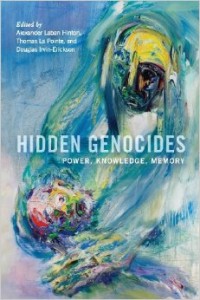Check out this new addition to The Ames Library collection!
From the publisher’s website:
Why are some genocides prominently remembered while others are ignored, hidden, or denied? Consider the Turkish campaign denying the Armenian genocide, followed by the Armenian movement to recognize the violence. Similar movements are building to acknowledge other genocides that have long remained out of sight in the media, such as those against the Circassians, Greeks, Assyrians, the indigenous peoples in the Americas and Australia, and the violence that was the precursor to and the aftermath of the Holocaust.
 The contributors to this collection look at these cases and others from a variety of perspectives. These essays cover the extent to which our biases, our ways of knowing, our patterns of definition, our assumptions about truth, and our processes of remembering and forgetting as well as the characteristics of generational transmission, the structures of power and state ideology, and diaspora have played a role in hiding some events and not others. Noteworthy among the collection’s coverage is whether the trade in African slaves was a form of genocide and a discussion not only of Hutus brutalizing Tutsi victims in Rwanda, but of the execution of moderate Hutus as well.
The contributors to this collection look at these cases and others from a variety of perspectives. These essays cover the extent to which our biases, our ways of knowing, our patterns of definition, our assumptions about truth, and our processes of remembering and forgetting as well as the characteristics of generational transmission, the structures of power and state ideology, and diaspora have played a role in hiding some events and not others. Noteworthy among the collection’s coverage is whether the trade in African slaves was a form of genocide and a discussion not only of Hutus brutalizing Tutsi victims in Rwanda, but of the execution of moderate Hutus as well.
Hidden Genocides is a significant contribution in terms of both descriptive narratives and interpretations to the emerging subfield of critical genocide studies.
From Amazon.com:
Review
(Frank Chalk Montreal Institute for Genocide and Human Rights Studies, Concordia University 2013-07-30)
(Jens Meierhenrich London School of Economics and Political Science 2013-07-30)
About the Author
ALEXANDER LABAN HINTON is the director of the Center for the Study of Genocide and Human Rights and a professor of anthropology and global affairs at Rutgers University, Newark. He is the author of the award-winning Why Did They Kill?: Cambodia in the Shadow of Genocide and six edited collections.
THOMAS LA POINTE is a member of the Center for Peace, Justice, and Reconciliation and an assistant professor of literature and composition at Bergen Community College. He has taught at the Shanghai International Studies University, China, and served as a journalist at the Institute for Central American Studies, Costa Rica.
DOUGLAS IRVIN-ERICKSON is an affiliate of the Center for the Study of Genocide, Conflict Resolution, and Human Rights at Rutgers University, Newark.
